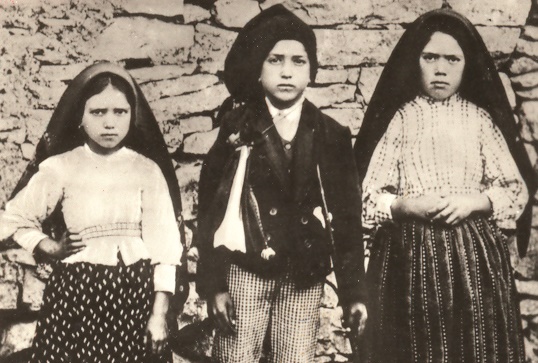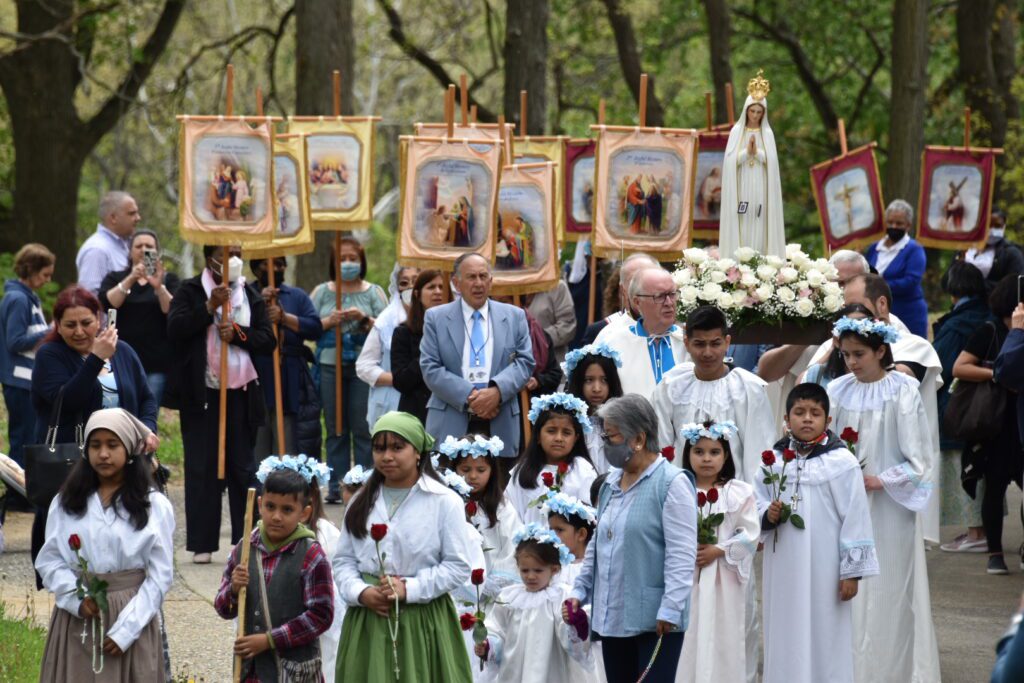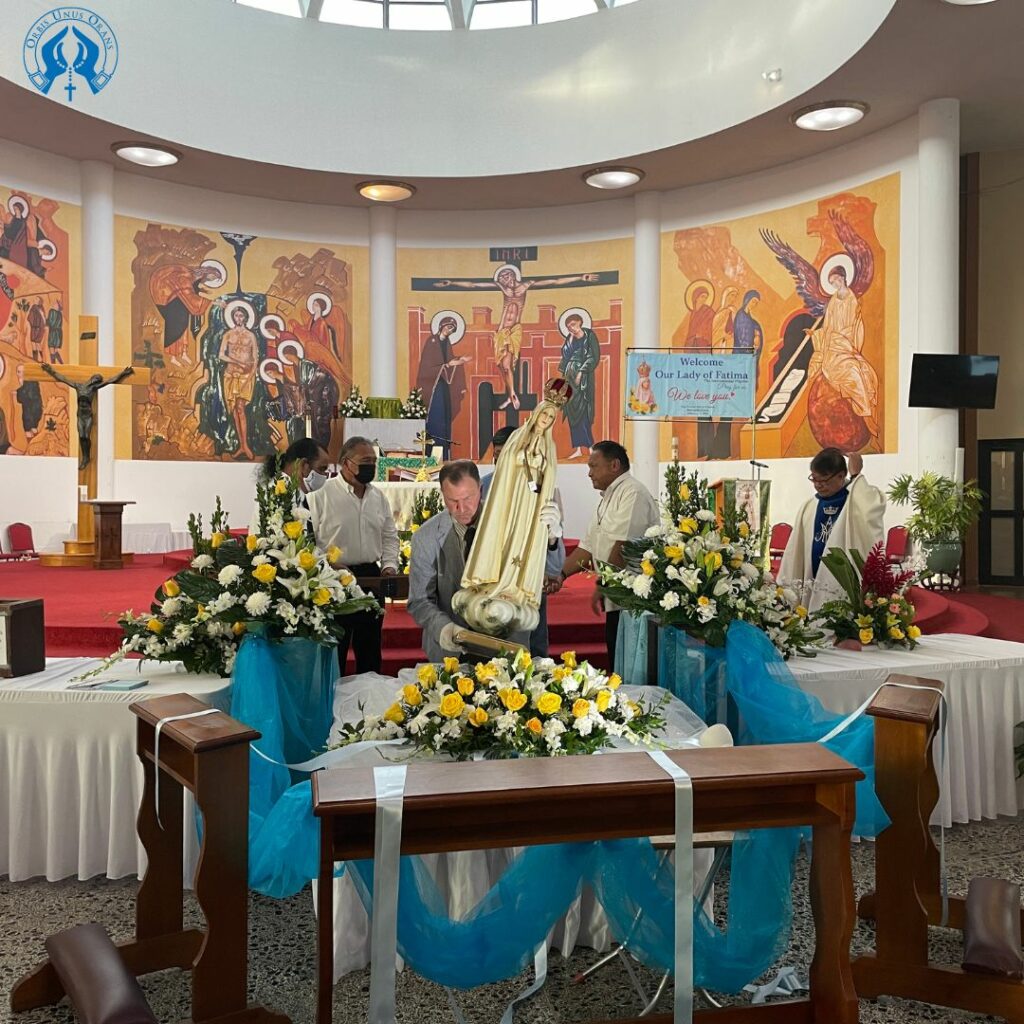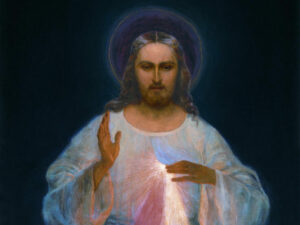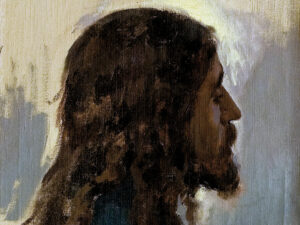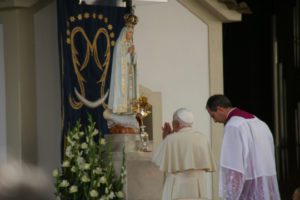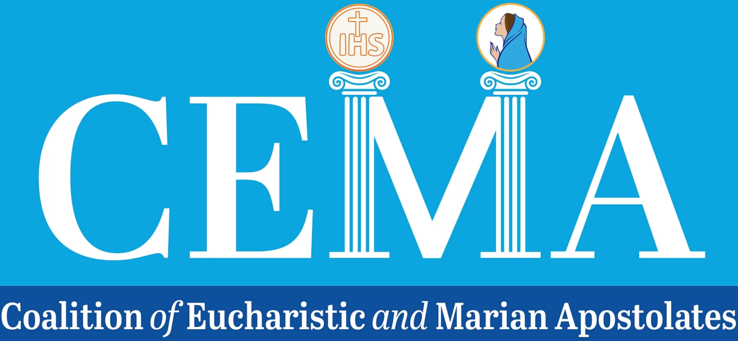by Donal Anthony Foley –


During the final apparition of Our Lady at Fatima, on Oct. 13, 1917, she said to the children that she was the Lady of the Rosary, thus emphasizing the importance of the Rosary, and intimately linking herself with it. She also told them to, “Continue always to pray the Rosary every day.” These are important points for us to remember, especially since October is the month of the Rosary.
Lucia then spoke of the many things she had to ask for, cures, conversions, favors and so on. Our Lady responded by saying, “Some yes, but not others. They must amend their lives and ask forgiveness for their sins.”
Then, Lucia tells us, looking very sad, Our Lady said, “Do not offend the Lord our God anymore, because He is already so much offended”—her last words at Fatima.
With that, she opened her hands and made them reflect on the sun, initiating the miracle that enthralled and terrified the tens of thousands who filled the Cova da Iria. After this, she disappeared into the immense distance of the sky and the young seers saw three apparitions symbolizing the mysteries of the Rosary.
“Do not offend the Lord…” were her last words at Fatima, and as such they are very important in understanding the overall message of Fatima. She could have concluded her apparitions by asking everyone to intensify their prayers and penances, or emphasized the importance of doing good deeds, but instead she focused on the sins of mankind and how offensive they were to God.
Sister Lucia commented on this in her memoirs, indicating how much they had moved her: “Of all the words spoken at this apparition, the ones most deeply engraved upon my heart were those of the request made by our heavenly Mother: ‘Do not offend Our Lord and God anymore, because He is already so much offended!’ How loving a complaint, how tender a request! Who will grant me to make it echo through the whole world, so that all the children of our Mother in Heaven may hear the sound of her voice!”
We can get a better idea of how much mankind’s sins were affecting God by looking at what Jacinta said to Lucia before she died. On one occasion she said, “Our Lord is sad, because Our Lady told us not to offend Him anymore, for He is already very much offended; yet nobody takes any notice, and they continue to commit the same sins!”
It is worth noting that although in traditional Catholic theology, the Godhead—the Holy Trinity—is regarded as both impassible and immutable, not subject to suffering or change regarding the created human nature of Christ, this is not the case. Therefore, Christ as the God-Man can experience emotions such as sadness. And this point explains the following words of Francisco to Lucia:
“I loved seeing the Angel, but I loved still more seeing Our Lady. What I loved most of all was to see Our Lord in that light from Our Lady which penetrated our hearts. I love God so much! But He is very sad because of so many sins! We must never commit any sins again.”
Those words were uttered over 100 years ago – so what would Francisco and Jacinta say about the state of things nowadays? Surely, the amount of sin worldwide has increased a hundred fold if not a thousand fold since then.
In that era, radio was in its infancy, television was yet to come and the cinema had yet to exert a really widespread influence. The standards of morality upheld by society were generally good and rates of divorce, for example, were still relatively low. Abortion was first legalized in 1920 in Russia, but it was decades before this example was followed more generally in the West.
If we compare that with the situation in our own times, then it is clear there has been an explosion in sinful behavior since and a dramatic decline in moral standards. Pornography is freely available, particularly on the internet, drug use and abuse is at unprecedented levels, and abortion has become almost a “secular sacrament” in the West. Sexual abuse is endemic in our society, and in general we are seeing a return to the type of pagan morality that prevailed in ancient times.
If Christ, as seen by the seers in the light from Our Lady’s hands, was very sad and offended because of the sins of that era, what must His thoughts and feelings be now as He looks down on our increasingly corrupt world?
All of this and much more, represents the moral and ethical reality that Catholics have to face. We have more need than ever of the protection of Our Lady if we are to survive this onslaught of obscenity and depravity. And so the necessity of accepting and putting into practice the message of Fatima becomes ever more imperative. As the world grows worse, we must become better – despite all our faults and failings.
In living the message of Fatima we can make a difference. We may be few in number in comparison with the increasing number of those who have forgotten or are ignoring God, but through the mediating power of Our Lady, our feeble efforts can be turned into spiritual gold. This is particularly the case with the Rosary and the Five First Saturdays devotion.
The early Christians were few in number and the idea of converting the Roman Empire must have seemed fanciful at the time. But the fact is, they persevered and finally saw the conversion of the Empire during the reign of Constantine.
We know that we are on the winning side and that Our Lady’s Heart will triumph and peace will reign. For those who lived under Russian Communism, freedom must have seemed like a very distant prospect, but it did eventually come in the 1980s and early 90s, when Communism fell so quickly.
The current culture of death that surrounds us, will, despite appearances to the contrary, eventually collapse. Our job in the meantime is to keep working and praying for the triumph of our heavenly Mother, and also doing what we can to ensure that God is no longer so much offended, but rather honored and loved by all mankind.
Donal Anthony Foley is the author of a number of books on Marian Apparitions, and maintains a related web site at www.theotokos.org.uk.


